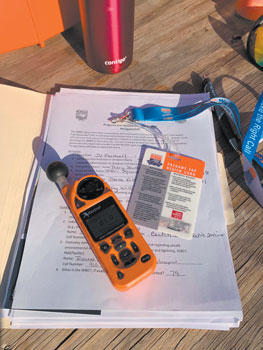 A Friday night high school football stadium packed with fans watching two teams battle has the potential for disaster if bad weather should suddenly develop.
A Friday night high school football stadium packed with fans watching two teams battle has the potential for disaster if bad weather should suddenly develop.
Fortunately for fans at North Carolina High School Athletic Association events, procedures are in place to make sure there is a coordinated plan for getting athletes and spectators to safety.
The NCHSAA has something called the Pregame Emergency Action Plan Report. It’s put together by the athletic trainer for the home team and provides an assortment of critical information to help guide game personnel through the needed steps to ensure everyone’s safety.
Sheri Squire, who has been an athletic trainer at Terry Sanford for the past seven years, said the report is designed to provide specific information about the location where the game is being played that can be shared with both the visiting team and the officials who are calling the game.
“It’s basically so we know exactly what’s going on at that site during that event so we have an emergency plan in place,’’ Squire said.
Emergency plans are typically posted at schools, but this one is more specific since it deals with the exact venue of the athletic event and is shared in person with those who need the information.
The report includes contact information for the game-day administrator, the athletic trainers or first responders of both teams along with the name of the head of the officiating crew and the names of any medical personnel who might be attending the game.
For outdoor events, there is additional information on where the safe shelter is located and what the route to get there is.
A name is also provided for the person who is monitoring weather conditions, including lightning and the wet bulb temperature, which determines whether it’s too hot for play to continue.
Squire uses a handheld device called a Kestrel Heat Stress Tracker to find the wet bulb temperature before the game starts and record it on the form. If it’s 88.9 degrees at kickoff special precautions have to be taken. If it’s 92 or above, the game may have to be stopped or suspended until it gets cooler.
A lightning detector is usually monitored by the game administrator or someone else to make sure the stadium is cleared before lightning gets too close to the field to strike someone.
In addition to the form, Squire and other athletic trainers have a badge provided by the NCHSAA that includes a checklist for things to watch out for at all events and especially outdoor events.
“I like the fact it’s all in one place,’’ Squire said. “You ask the important questions. Now it’s going to make everybody be on the same page. It helps you keep your I’s dotted and T’s crossed.’’
Pictured: A copy of the pregame emergency report rests beneath the Kestrel heat stress device and the NCHSAA pre-game checklist badge.
 A Friday night high school football stadium packed with fans watching two teams battle has the potential for disaster if bad weather should suddenly develop.
A Friday night high school football stadium packed with fans watching two teams battle has the potential for disaster if bad weather should suddenly develop.
 How to resolve AdBlock issue?
How to resolve AdBlock issue? 








